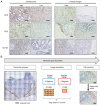Prognostic value of a modified‑immune scoring system in patients with pathological T4 colorectal cancer
- PMID: 38298428
- PMCID: PMC10829066
- DOI: 10.3892/ol.2024.14237
Prognostic value of a modified‑immune scoring system in patients with pathological T4 colorectal cancer
Abstract
Tumor-infiltrating immune cells, such as lymphocytes and macrophages, have been associated with tumor aggressiveness, prognosis and treatment response in colorectal cancer (CRC). An immune scoring system, Immunoscore (IS), based on tumor-infiltrating T cells in stage I-III CRC, was used to predict prognosis. An alternative immune scoring signature of immune activation (SIA) reflects the balance between anti- and pro-tumoral immune components. The present study aimed to evaluate the prognostic value of modified IS (mIS) and modified SIA (mSIA) in locally advanced pathological T4 (pT4) CRC, including stage IV CRC. Immunohistochemical staining for immune cell markers, such as CD3 (pan-T cell marker), CD8 (anti-tumoral cytotoxic T cell marker) and CD163 (tumor-supportive macrophage marker), in specimens from patients with radically resected pT4 CRC at stages II-IV was performed. mIS levels in the T4 CRC cohort were not associated with prognosis. However, low mSIA levels were associated with low survival. Furthermore, low mSIA was an independent predictor of recurrence in patients with radically resected pT4 CRC. In patients with CRC who did not receive postoperative adjuvant chemotherapy, low mSIA was a major poor prognostic factor; however, this was not observed in patients receiving adjuvant chemotherapy. Evaluation of the tumor-infiltrating immune cell population could serve as a valuable marker of recurrence and poor prognosis in patients with locally advanced CRC. mSIA assessment after radical CRC resection may be promising for identifying high-risk patients with pT4 CRC who require aggressive adjuvant chemotherapy.
Keywords: Immunoscore; colon cancer; immune cell infiltration; locally advanced colon cancer; prognostic marker; signature of immune activation; tumor immunity.
Copyright: © Dorjkhorloo et al.
Conflict of interest statement
The authors declare that they have no competing interests.
Figures



Similar articles
-
Validation of the prognostic value of CD3 and CD8 cell densities analogous to the Immunoscore® by stage and location of colorectal cancer: an independent patient cohort study.J Pathol Clin Res. 2023 Mar;9(2):129-136. doi: 10.1002/cjp2.304. Epub 2022 Nov 24. J Pathol Clin Res. 2023. PMID: 36424650 Free PMC article.
-
Immunoscore encompassing CD3+ and CD8+ T cell densities in distant metastasis is a robust prognostic marker for advanced colorectal cancer.Oncotarget. 2016 Dec 6;7(49):81778-81790. doi: 10.18632/oncotarget.13207. Oncotarget. 2016. PMID: 27835889 Free PMC article.
-
Differential gene expression of tumor-infiltrating CD8+ T cells in advanced versus early-stage colorectal cancer and identification of a gene signature of poor prognosis.J Immunother Cancer. 2020 Sep;8(2):e001294. doi: 10.1136/jitc-2020-001294. J Immunother Cancer. 2020. PMID: 32948653 Free PMC article.
-
Immunity to live: an immunopathoscore using the consensus Immunoscore to best define the risk of recurrence and death in stage IV metastatic patients.Oncoimmunology. 2020 Oct 13;9(1):1826133. doi: 10.1080/2162402X.2020.1826133. Oncoimmunology. 2020. PMID: 33110705 Free PMC article. Review.
-
Colorectal Cancer Immune Infiltrates: Significance in Patient Prognosis and Immunotherapeutic Efficacy.Front Immunol. 2020 May 28;11:1052. doi: 10.3389/fimmu.2020.01052. eCollection 2020. Front Immunol. 2020. PMID: 32547556 Free PMC article. Review.
References
-
- Daitoku N, Miyamoto Y, Hiyoshi Y, Tokunaga R, Sakamoto Y, Sawayama H, Ishimoto T, Baba Y, Yoshida N, Baba H. Preoperative skeletal muscle status is associated with tumor-infiltrating lymphocytes and prognosis in patients with colorectal cancer. Ann Gastroenterol Surg. 2022;6:658–666. doi: 10.1002/ags3.12570. - DOI - PMC - PubMed
Grants and funding
LinkOut - more resources
Full Text Sources
Research Materials
